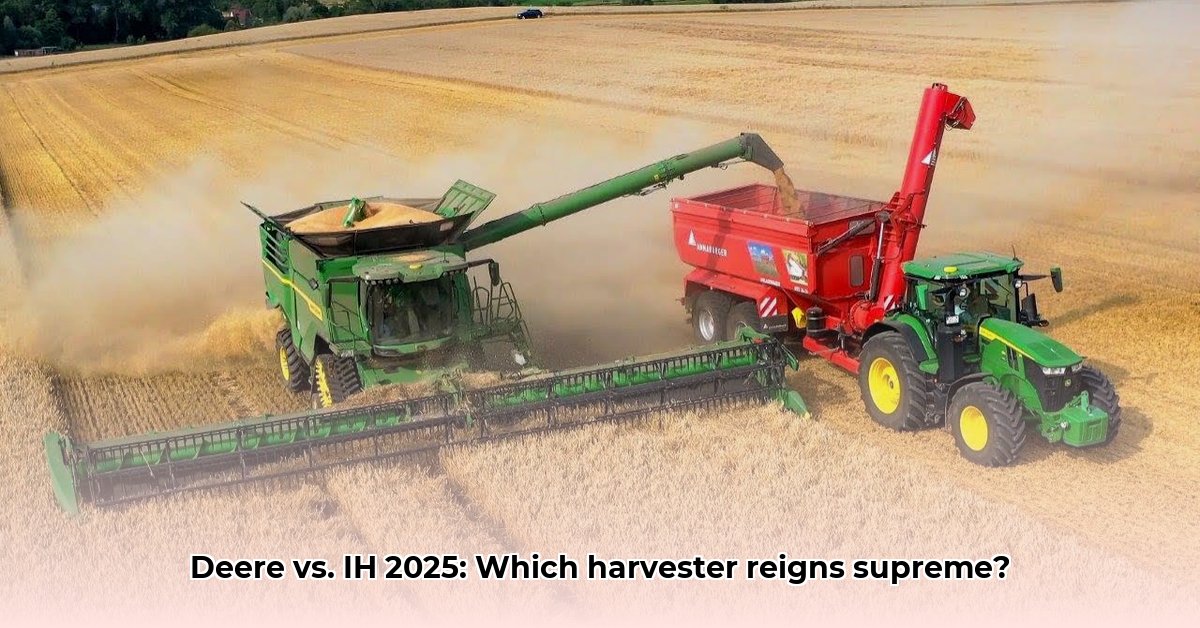
Choosing the right harvesting equipment is a crucial decision impacting efficiency, profitability, and environmental responsibility. John Deere and Case IH, industry giants, offer compelling solutions, but their approaches diverge significantly. This comparative review analyzes their key features, software integration, sustainability efforts, and target markets to help you make an informed choice. For troubleshooting John Deere equipment, check out this helpful resource: John Deere troubleshooting.
Key Features and Technologies: A Detailed Comparison
Both John Deere and Case IH boast advanced harvesting technologies, but their strengths lie in different areas. Deere prioritizes comprehensive data integration and automation, while Case IH emphasizes robust, reliable machines with a user-friendly approach.
John Deere: Deere's strength lies in its highly integrated system. Their Operations Center acts as a central hub, collecting data from various machines and providing detailed insights for optimized farming practices. This interconnectedness enables precise planning, predictive maintenance, and overall increased efficiency. However, this deep integration means a higher learning curve and a dependence on the Deere ecosystem.
Case IH: Case IH combines are known for their durability and straightforward operation. While automation features are available, the system is less intricately integrated, resulting in a potentially simpler learning curve and potentially lower initial costs. Data management may require integrating data from multiple sources, though.
| Feature | John Deere | Case IH |
|---|---|---|
| Auto-Steer | Seamlessly integrated, highly precise | Available; integration may be less seamless |
| Data Collection & Analysis | Comprehensive, centralized in Operations Center | Good; may require integration of data from multiple sources |
| Fuel Efficiency | Strong focus; exact figures vary by model | High fuel efficiency is a priority; direct comparisons difficult |
| Sustainability Features | Emphasis on sustainable manufacturing and fuel efficiency | Focus on designing fuel-efficient engines and reducing emissions |
| Ease of Use | Steeper learning curve due to integrated system complexity | Generally more user-friendly and straightforward |
Software and Data Integration: Control and Connectivity
Data management is a critical aspect of modern farming. John Deere's Operations Center offers comprehensive data analysis, but this comes with the caveat of Deere controlling a significant amount of your farm data. Understanding their data security and privacy policies is essential.
Case IH provides more flexibility, leveraging interoperable solutions and giving farmers greater control over their data. While this approach requires managing multiple platforms, it offers more autonomy. This trade-off between convenience and data ownership should be carefully considered.
Sustainability: Environmental Responsibility in Agriculture
Both companies are committed to sustainable practices. John Deere focuses on reducing its environmental footprint through sustainable manufacturing processes. Case IH prioritizes designing fuel-efficient combines and minimizing emissions throughout the machine’s lifecycle. Both brands offer opportunities for environmentally conscious farming, but their approaches differ. Research specific models and their environmental impact for a detailed comparison.
Target Market and Pricing: Finding the Right Fit
John Deere's advanced technology and integrated systems make them ideally suited for large-scale operations where precision agriculture and data-driven decision-making are crucial. However, this advanced technology comes with a higher price tag.
Case IH provides a more accessible option for smaller-scale farmers and those prioritizing affordability and straightforward operation. While they may not offer the same level of sophisticated data analysis, their reliability and lower initial investment are significant advantages. Pricing fluctuates greatly depending on the specific model and features.
Conclusion: Choosing the Best Harvester for Your Needs
There’s no single “best” harvester; the ideal choice depends entirely on your specific needs. John Deere’s integrated system is advantageous for large-scale operations requiring advanced data analytics and automation. Case IH's focus on reliability and ease of use makes them a stronger choice for smaller farms or those seeking a more user-friendly approach.
Before making a decision, carefully consider your farm's size, budget, technological aptitude, and long-term goals. Consult with other farmers, equipment dealers, and explore independent reviews to gauge real-world performance and gather essential data points to inform your final choice. Remember to factor in long-term maintenance and repair costs, as these can significantly impact the overall cost of ownership.